Aliyev, Stadnik win gold at Islamic Solidarity Games
Wednesday, August 10, 2022 - 22:06 By Ali Feizasa

KONYA, Turkey (August 10) -- Azerbaijan captured three gold medals while Iran won two on the first first day of the Islamic Solidarity Games in Konya, Turkey.
The 5th Islamic Solidarity Games, originally scheduled to be held in 2021, were postponed by a year due to the COVID-19 pandemic. About 4200 athletes from 56 countries have arrived in Konya to compete in 19 different sports and four para-sports.
Wrestling got underway at the Games on Wednesday with five freestyle and two women's weight categories.
In freestyle, Iran and Azerbaijan grabbed two gold medals each on the first day while Uzbekistan succeed to take one gold.
Olympic silver medalist and three-time world champ Haji ALIYEV (AZE) won the 65kg gold medal after beating Zelimkhan ABAKAROV (ALB) in the final to repeat his gold medal win from the 2017 Games in Baku.
However, it wasn't an easy run for him as he was in trouble in the quarterfinal against Tokyo Olympian Morteza GHIASI (IRI) but came from behind to win the match.
With less than 30 seconds to the end, Ghiasi led 4-1 but Aliyev hit a double and gut wrenches to earn an 8-4 victory.

In another close Azerbaijan-Iran bout, Turan BAYRAMOV (AZE) earned the second gold for Azerbaijan by a 2-1 victory over Mohammadsadegh FIROUZPOUR (IRI) in the 74kg final.
The first gold medal for Iran came from 86kg as three-time World Championships medalist Alireza KARIMI (IRI) dominated the final against Abubakr ABAKAROV (AZE).
Karimi controlled the bout by several takedowns and had a 9-0 lead when Abakarov signaled for a forfeit citing an injury. Karimi outscored his opponents 29-0 in the three bouts.
 Mojtaba GOLEIJ (IRI) was crowned as the 97kg champion in Konya. (Photo: United World Wrestling)
Mojtaba GOLEIJ (IRI) was crowned as the 97kg champion in Konya. (Photo: United World Wrestling)
2021 World bronze medalist Mojtaba GOLEIJ (IRI) doubled Iran's gold medal count with an easy win over local wrestler Mustafa SESSIZ (TUR) in the 97kg final.
Goleij opened the bout with two points when the Turkey wrestler failed to continue further due to an injury.
Tokyo Olympian Muminjon ABDULLAEV (UZB) won the first gold of the night as he downed Almaz SMANBEKOV (KGZ) in the 57kg final bout to put the gold in Uzbekistan's pocket.

Stadnik's golden return
The two women’s wrestling weight classes in action on Wednesday were 50kg and 59kg.
10-time Olympic and World medalist Mariya Stadnik (AZE) made a return to competitive wrestling for the first time since Tokyo Olympics and it was golden.
The four-time Olympic medalist defended her gold medal from the 2017 Games with a brilliant performance.
Over the course of her four bouts, she had a 40-0 record and celebrated her title by a 10-0 victory over Jasmina IMMAEVA (UZB).
 Odunayo ADEKUOROYE (NGR) defended her 59kg gold in Konya. (Photo: United World Wrestling)
Odunayo ADEKUOROYE (NGR) defended her 59kg gold in Konya. (Photo: United World Wrestling)
After winning gold less than a week ago at the Commonwealth Games in Birmingham, Odunayo ADEKUOROYE (NGR) became the third wrestler of the day who defended her title from the 2017 edition of the Games.
Wrestling at 59kg, three-time world medalist Adekuoroye earned 27 points against her four rivals. Since there were five wrestlers in the weight class, it was conducted in a Nordic bracket.
Adekuoroye won the gold medal with Alyona KOLESNIK (AZE) winning the silver and Elmas CELIK (TUR) grabbing the bronze.
Wrestling at the Islamic Solidarity Games continues Thursday with 61kg, 70kg, 79kg, 92kg and 125 kg in freestyle and 53kg, 62kg and 72kg in women’s wrestling.

Day 1 Results
Freestyle
57kg
GOLD: Muminjon ABDULLAEV (UZB) df. Almaz SMANBEKOV (KGZ)
BRONZE: Rakhat KALZHAN (KAZ) df. Asil AL MAKTARI (YEM)
BRONZE: Aliabbas RZAZADE (AZE) df. Hikmatullo VOHIDOV (TJK)
65kg
GOLD: Haji ALIYEV (AZE) df. Zelimkhan ABAKAROV (ALB), via fall
BRONZE: Morteza GHIASI (IRI) df. Umidjon JALALOV (UZB), 4-2
BRONZE: Adlan ASKAROV (KAZ) df. Kerim HOJAKOV (TKM),
74kg
GOLD: Turan BAYRAMOV (AZE) df. Mohammadsadegh FIROUZPOUR (IRI), 2-1
BRONZE: Ikhtiyor NAVRUZOV (UZB) df. Ikkal ABDELK (ALG)
BRONZE: Fazli ERYILMAZ (TUR) df. Nurkozha KAIPANOV (KAZ)
86kg
GOLD: Alireza KARIMI (IRI) df. Abubakr ABAKAROV (AZE), 9-0 (victory via injury)
BRONZE: Osman GOCEN (TUR) df. Azizbek FAYZULLAEV (UZB), 11-6
BRONZE: Nurtilek KARYPBAEV (KGZ) df. Fateh BENFERDJALLAH (ALG)
97kg
GOLD: Mojtaba GOLEIJ (IRI) df. Mustafa SESSIZ (TUR), 2-0 (victory via injury)
BRONZE: Magomed IBRAGIMOV (UZB) df. Hemel YAYEV (TKM), 2-2
BRONZE: Mamed IBRAGIMOV (KAZ) df. Baisal KUBATOV (KGZ)
Women’s Wrestling
50kg
GOLD: Mariya STADNIK (AZE) df. Jasmina IMMAEVA (UZB), 10-0
BRONZE: Hamdi SARRA (TUN) df. Svetlana ANKICHEVA (KAZ)
59kg
Round 5: Odunayo ADEKUOROYE (NGR) df. Guldana BEKESH (KAZ)
Round 5: Elmas CELIK (TUR) df. Dilfuza AIMBETOVA (UZB)
GOLD: Odunayo ADEKUOROYE (NGR)
SILVER: Alyona KOLESNIK (AZE)
BRONZE: Elmas CELIK (TUR)

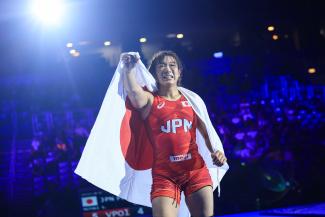
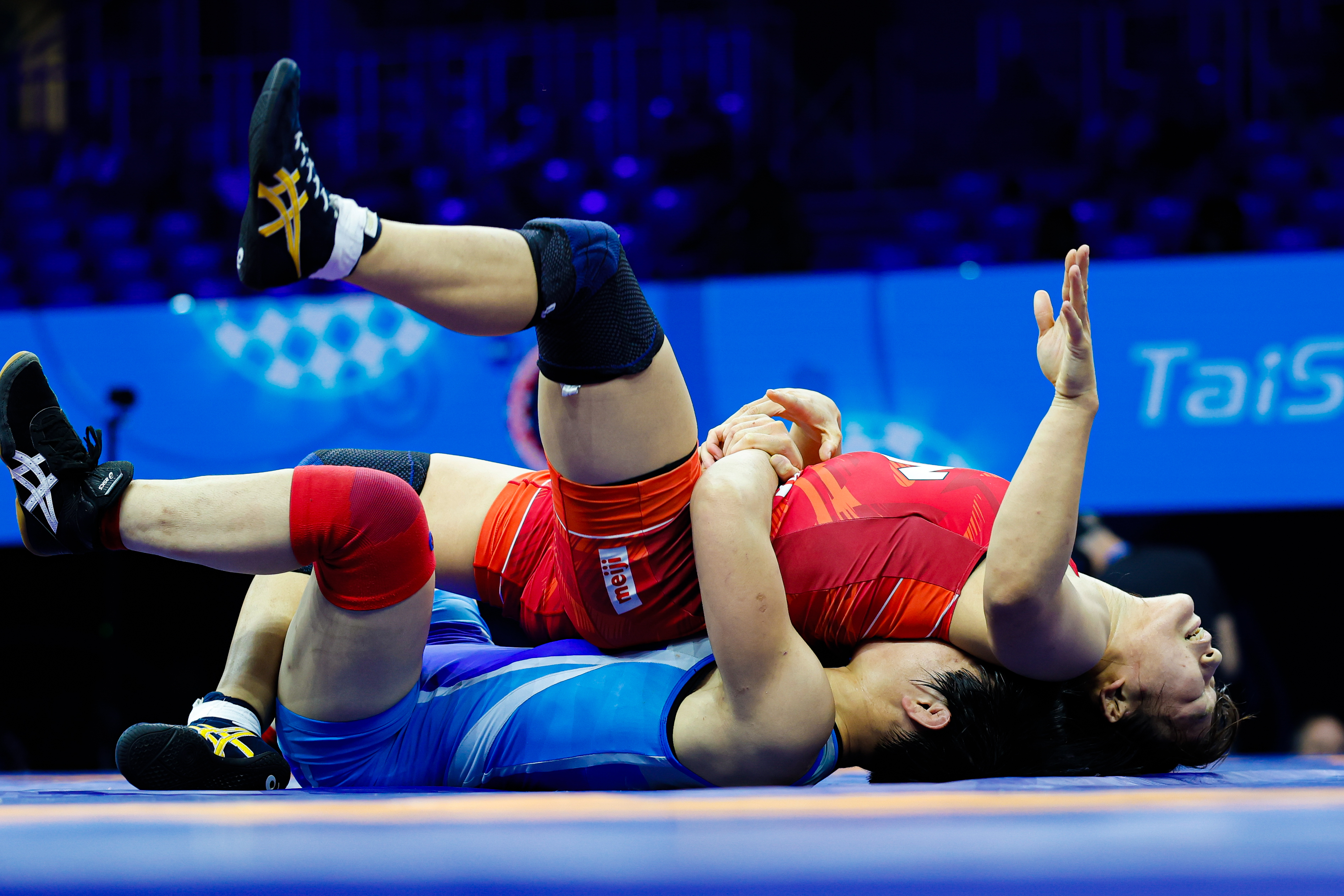 Ok Ju KIM (PRK) turns Sakura MOTOKI (JPN) to take a 4-3 lead in the 62kg final. (Photo: United World Wrestling / Kostadin Andonov)
Ok Ju KIM (PRK) turns Sakura MOTOKI (JPN) to take a 4-3 lead in the 62kg final. (Photo: United World Wrestling / Kostadin Andonov)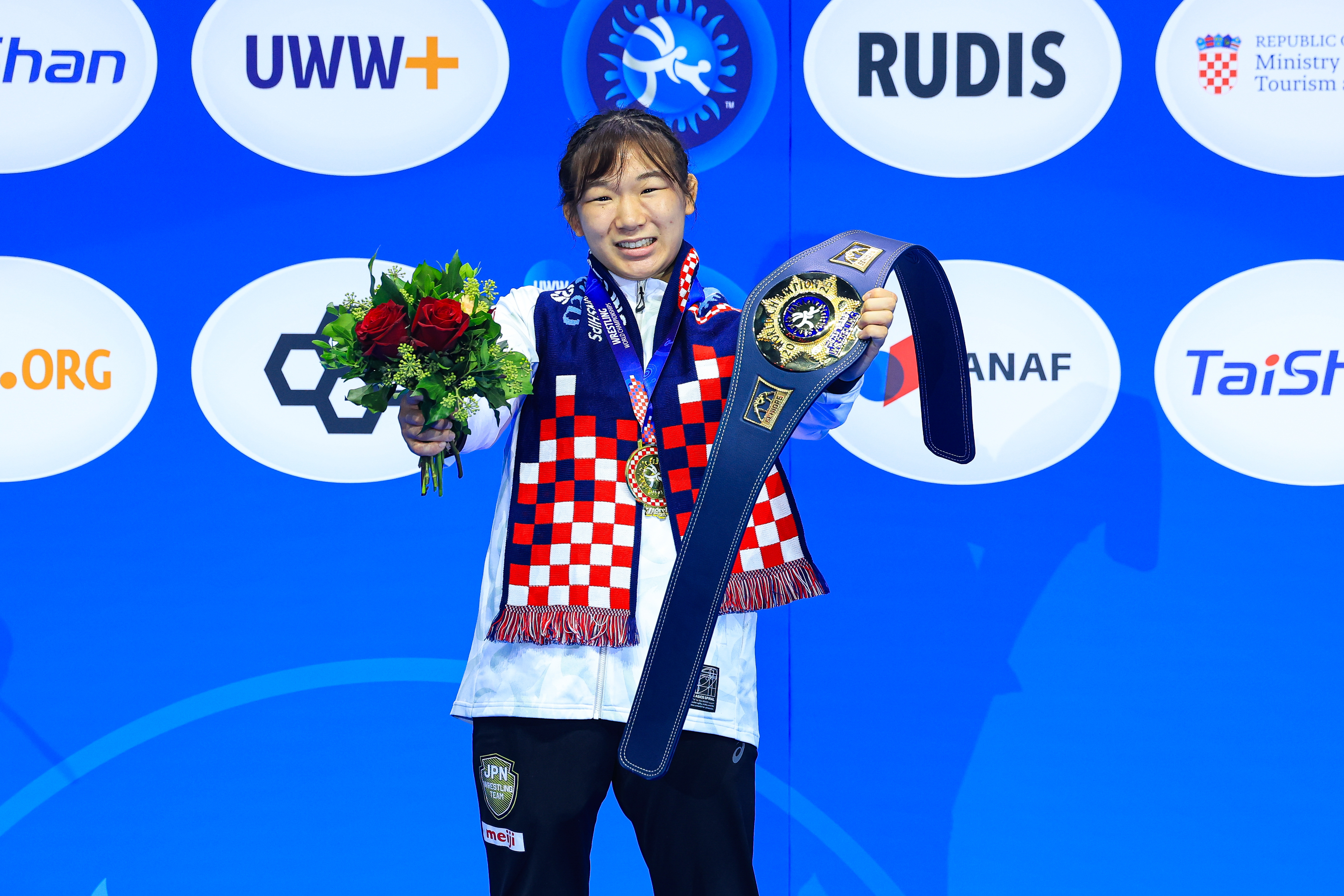 Sakura MOTOKI (JPN) won her first world gold medal in Zagreb. (Photo: United World Wrestling / Kadir Caliskan)
Sakura MOTOKI (JPN) won her first world gold medal in Zagreb. (Photo: United World Wrestling / Kadir Caliskan)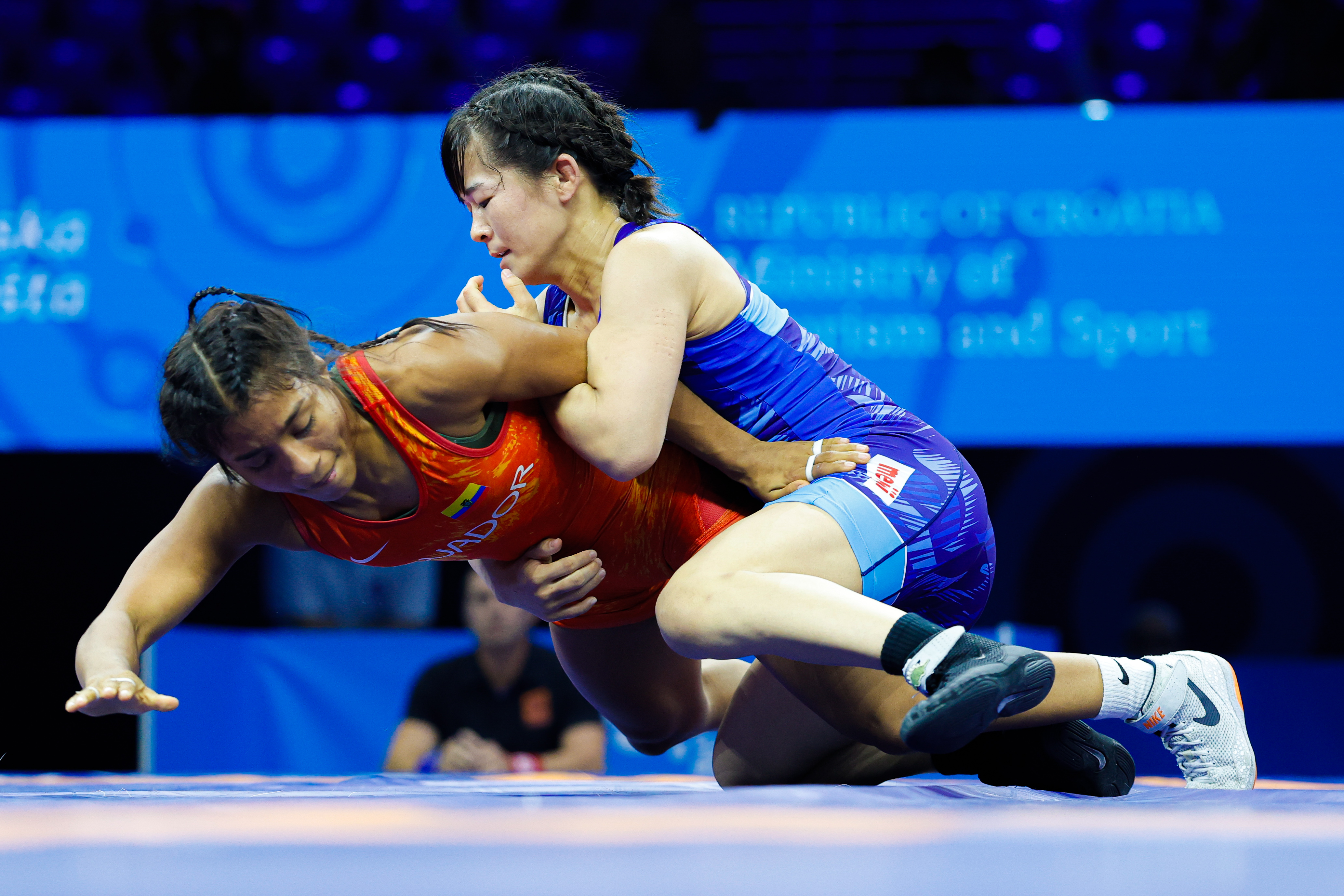 Haruna MURAYAMA (JPN) controls Lucia YEPEZ (ECU) during the 53kg final at the World Championships. (Photo: United World Wrestling / Kostadin Andonov)
Haruna MURAYAMA (JPN) controls Lucia YEPEZ (ECU) during the 53kg final at the World Championships. (Photo: United World Wrestling / Kostadin Andonov)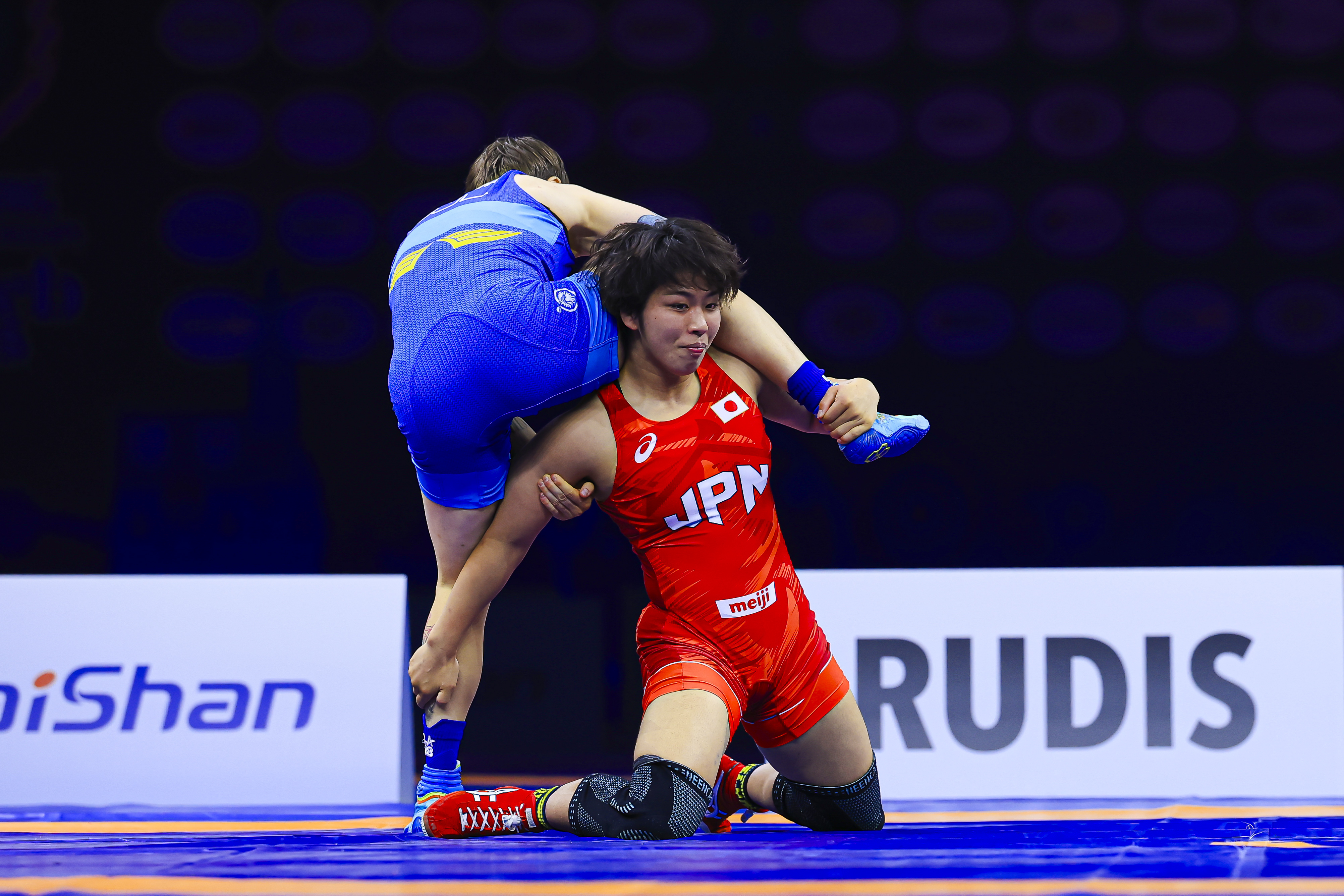 Ami ISHII (JPN) tries to score on Yuliana YANEVA (BUL) in the 68kg final. (Photo: United World Wrestling / Kadir Caliskan)
Ami ISHII (JPN) tries to score on Yuliana YANEVA (BUL) in the 68kg final. (Photo: United World Wrestling / Kadir Caliskan)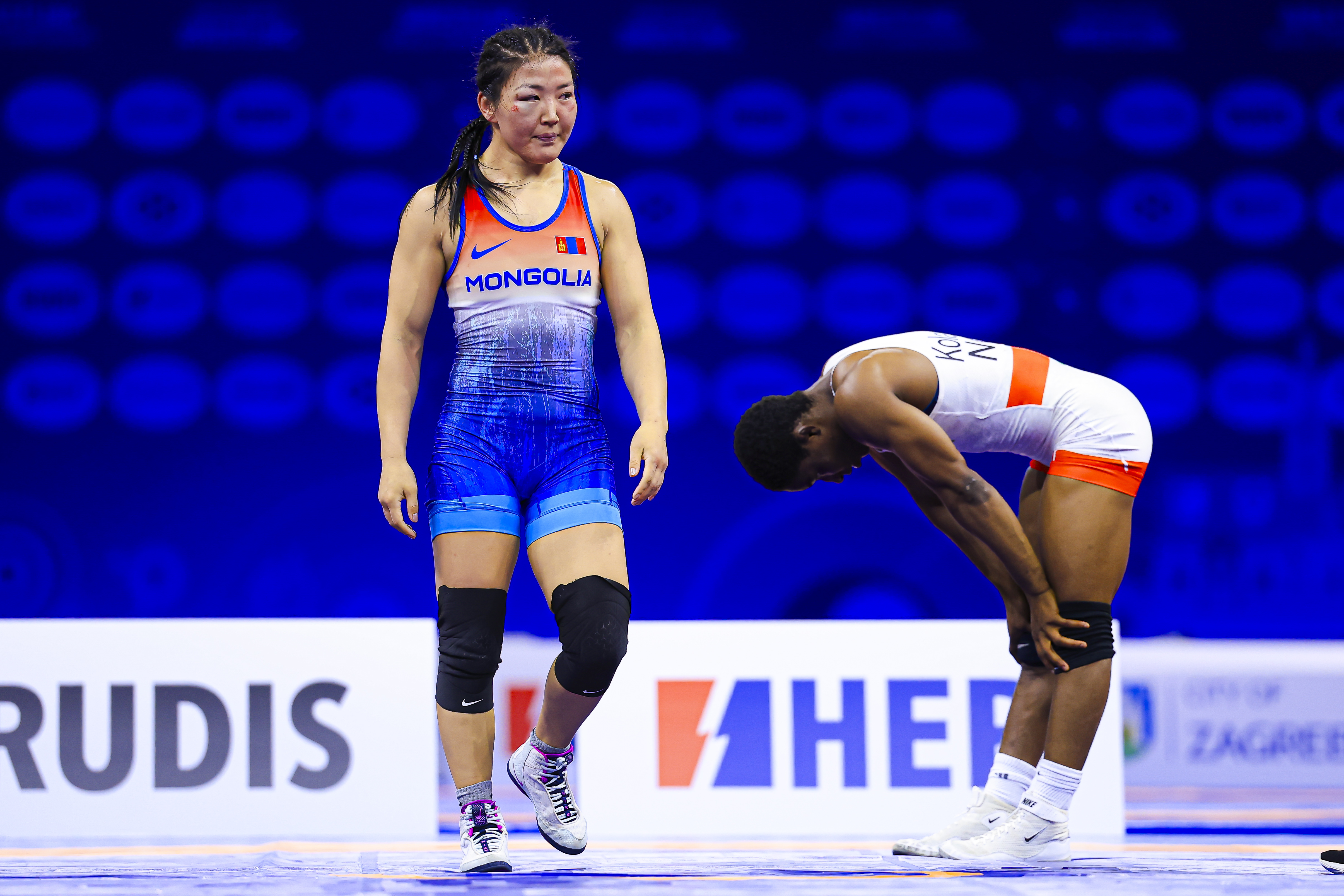 Orkhon PUREVDORJ (MGL) defeated Esther KOLAWOLE (NGR) to win bronze at 62kg. (Photo: United World Wrestling / Kadir Caliskan)
Orkhon PUREVDORJ (MGL) defeated Esther KOLAWOLE (NGR) to win bronze at 62kg. (Photo: United World Wrestling / Kadir Caliskan)
Share your thoughts.
Comments